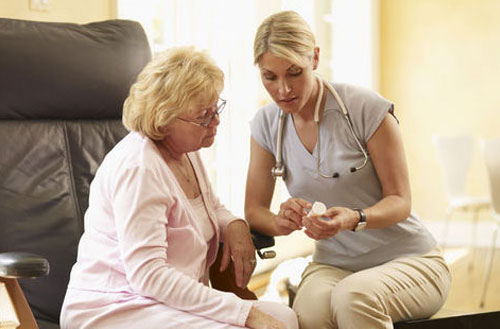Southeast Texas Senior Diabetes Care and Foot Wounds
Diabetes continues to be a growing concern for Southeast Texas senior citizens. Southeast Texas home health agencies like Harbor Home Health are creating diabetes management plans for each senior’s specific needs.
One serious Southeast Texas senior health issue that is directly related to diabetes is foot wounds.
A Southeast Texas senior diabetic’s foot and ankle are especially vulnerable to wound problems. A Golden Triangle senior diabetic’s foot and ankle are prone to swelling, which can inhibit healing. It is also very difficult to immobilize the foot and ankle which makes the healing process even more challenging.
In addition, Southeast Texas senior diabetics are more likely than other people to have calluses, dry skin and nerve damage.
All of these factors combine to cause an increased risk of ulcers (open sores) and can often lead to infections. Along with loss of feeling in their feet, many people with diabetes have vision problems. So they may not either feel or see a small wound until it is already a serious issue.
A Southeast Texas senior citizen’s diabetic foot wound that becomes infected may lead to mandatory amputation.
Research shows that an ulcer generally precedes lower limb amputations in Southeast Texas seniors with diabetes. That’s why it’s so important to care for a wound before it becomes infected and to work hard to prevent wounds in the first place. Your Southeast Texas home care nurse can be a HUGE help.
For those under care of Southeast Texas Home Health agencies like Harbor Home Health, your SETX Home Health nurse can assist you in monitoring wounds that diabetes may be keeping you from seeing or feeling yourself. Your Golden Triangle Home Health nurse is also trained to assist you in wound prevention.
The best way to avoid wound problems is to prevent wounds in the first place:
- Check your feet daily. Look for blisters, calluses, chafing, and redness. If you have trouble seeing, have someone (your Home Health nurse, spouse, or care giver) inspect your feet daily.
- Pay attention to your skin. Check for small, seemingly minor skin problems like infected hair follicles or inflamed areas around the fingernails. If you notice a problem, point it out to your doctor or Home Health nurse.
- Moisturize your feet. Use moisturizer to keep the skin on your feet soft and supple. However, do not use lotions between your toes because this can sometimes lead to a fungal infection. To treat athlete’s foot, use a gel rather than a cream antifungal product because gels don’t leave a moisture residue between the toes. Bring any questions or concerns to your doctor or your Home Health nurse.
- Wear appropriate footwear. Wearing shoes that fit well and comfortably can help you avoid blisters. Closed-toe shoes reduce the risk of foot injury. If you have trouble finding shoes that fit properly, speak to your doctor. You may need a custom-made shoe.
- Inspect your shoes every day. A diabetic can walk around with a stone, splinter, or other object in their shoe without knowing it. You should also check for tears or rough areas on the inside of the shoe.
- Choose the right socks, socks that wick moisture away from your skin. Avoid socks with seams. Socks made specifically for people with diabetes are available in many specialty stores throughout Southeast Texas.
- Wash your feet daily. After washing your feet, dry them carefully, including between the toes (remember- Athlete’s Foot is dangerous for diabetics).
- Smooth away calluses. After your bath or shower, use an emery board or pumice stone to gradually remove calluses. Never cut calluses with scissors or a nail clipper. Your Home Health nurse can be a big help with this.
- Keep toenails clipped and even. Ingrown toenails can lead to foot problems. Have your doctor or Home Health nurse check your feet regularly.
- Manage your diabetes. Keeping your diabetes under control helps prevent foot wounds. Monitor your blood sugar. Track your blood pressure and cholesterol levels. Eat according to your doctor or nutritionist’s guidelines. Take medications as prescribed by your physician. Exercise regularly. Don’t smoke. Have regular medical checkups.
If you have additional questions about Southeast Texas senior diabetes management and foot wounds, ask your physician. If you would like to look into having a Home Health nurse assist you with your wound care prevention and/or treatment, call Harbor Home Health:




















